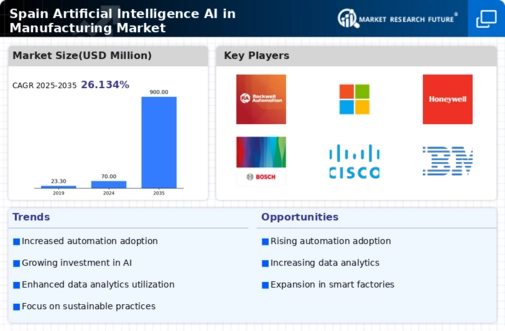Focus on Industry 4.0
The transition towards Industry 4.0 is a significant catalyst for the Spain artificial intelligence in manufacturing market. This paradigm shift emphasizes the integration of digital technologies, including AI, IoT, and big data, into manufacturing processes. Spanish manufacturers are increasingly recognizing the importance of adopting Industry 4.0 principles to remain competitive in a rapidly evolving market. Reports indicate that over 70% of Spanish manufacturers are investing in digital transformation initiatives, with AI playing a crucial role in this evolution. By leveraging AI technologies, companies can enhance operational efficiency, improve product customization, and reduce time-to-market. The focus on Industry 4.0 not only drives innovation but also encourages collaboration between technology providers and manufacturers, thereby fostering a vibrant ecosystem. As a result, the emphasis on Industry 4.0 is likely to significantly influence the growth trajectory of the Spain artificial intelligence in manufacturing market.
Skilled Workforce Development
The development of a skilled workforce is essential for the advancement of the Spain artificial intelligence in manufacturing market. As AI technologies become increasingly integrated into manufacturing processes, the demand for skilled professionals who can effectively implement and manage these technologies is rising. Educational institutions in Spain are responding to this need by offering specialized programs in AI and data science, aimed at equipping students with the necessary skills. Additionally, companies are investing in training programs to upskill their existing workforce, ensuring that employees are proficient in AI applications. This focus on workforce development is crucial, as it not only enhances the capabilities of the manufacturing sector but also attracts foreign investment. A well-trained workforce is likely to drive innovation and efficiency, thereby contributing to the overall growth of the Spain artificial intelligence in manufacturing market.
Government Support and Funding
The Spain artificial intelligence in manufacturing market benefits from robust government support and funding initiatives. The Spanish government has allocated substantial resources to promote AI adoption in manufacturing, with a focus on enhancing productivity and competitiveness. For instance, the National Artificial Intelligence Strategy aims to invest over 600 million euros by 2025 to foster AI research and development. This financial backing encourages manufacturers to integrate AI technologies, thereby streamlining operations and reducing costs. Furthermore, regional governments are also providing incentives for companies that adopt AI solutions, which could potentially lead to a more dynamic and innovative manufacturing sector. As a result, the influx of government funding is likely to accelerate the growth of the Spain artificial intelligence in manufacturing market, enabling firms to leverage advanced technologies for improved efficiency.
Emphasis on Sustainability and Efficiency
The growing emphasis on sustainability and efficiency is a key driver in the Spain artificial intelligence in manufacturing market. As environmental concerns become more pressing, manufacturers are increasingly adopting AI technologies to optimize resource usage and minimize waste. AI-driven solutions enable companies to analyze production processes and identify areas for improvement, leading to more sustainable practices. For instance, AI can facilitate energy management and predictive maintenance, which can significantly reduce operational costs and environmental impact. Reports suggest that companies implementing AI for sustainability initiatives can achieve up to a 30% reduction in energy consumption. This alignment with sustainability goals not only enhances corporate responsibility but also meets the expectations of consumers and stakeholders. Consequently, the emphasis on sustainability and efficiency is likely to propel the growth of the Spain artificial intelligence in manufacturing market, fostering a more responsible and innovative manufacturing landscape.
Rising Demand for Smart Manufacturing Solutions
The increasing demand for smart manufacturing solutions is a pivotal driver in the Spain artificial intelligence in manufacturing market. As manufacturers seek to enhance operational efficiency and reduce production costs, the integration of AI technologies becomes essential. According to recent data, the smart manufacturing market in Spain is projected to grow at a compound annual growth rate of 15% over the next five years. This growth is driven by the need for real-time data analytics, predictive maintenance, and automation. Companies are increasingly adopting AI-driven tools to optimize supply chains and improve product quality. The shift towards smart manufacturing not only enhances productivity but also positions Spain as a competitive player in the global manufacturing landscape. Consequently, the rising demand for these solutions is likely to propel the Spain artificial intelligence in manufacturing market forward, fostering innovation and technological advancement.
























